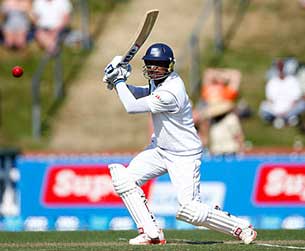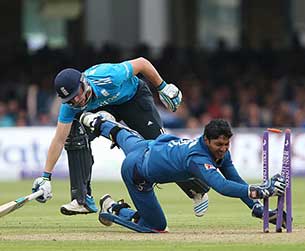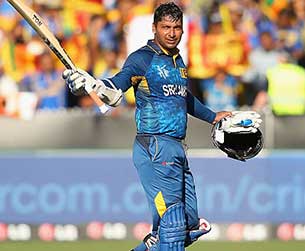Kumar Sangakkara is a skilled striker, dependable keeper, and sharp thinker. For almost 15 years, he was the foundation of Sri Lankan cricket. The legendary cricketer, who represented his nation in nearly 500 international matches, played his last match in a Test match against India in Colombo (PSS) in 2015.
| Born: 27 October 1977 | Nationality: Sri Lanka |
| Years Active: ( 2000-2015) | Birth Place: Matale, Sri Lanka |
| Height: 5ft 10in | Role: wicket-keeper, Batsman |
| Batting Style: Left-handed | Bowling Style: right-arm off break |
| Nickname: Sanga |
Sangakkara was born in 1977 in Matale, Central Province, close to the town of Kandy. Along with his parents and three siblings, he was raised in Kandy.
Sangakkara attended Trinity College in Kandy for his studies. He played the violin and sang in the choir when he was in school. Sangakkara was a star athlete in a variety of sports, but his college principal advised him to concentrate on cricket.
His parents provided refuge to Tamil families in 1983 during the Black July riots Sangakkara has twin kids, a daughter named Swyree and a son named Kavith, with his long-term partner Yehali.
He competed for his school's Under-13, Under-15, Under-17, Under-19, and first XI squads and received the Ryde Gold Medal and Trinity Lion awards. He was chosen to represent the Sri Lanka cricket team in their 1999–2000 tour of South Africa.
Sangakkara made a stunning entrance into the cricket scene. The selectors were persuaded of his talent with a scorching 156 against Zimbabwe A in 2000. At the young age of 22, he was given a spot in the one-day team, and in his second game, he received his first Man of the Match award. In his eleventh Test, he got his first Test century after being dismissed in the 90s twice before. His disposition was older than his years, which affected his batting.
Sangakkara quickly transformed into an appealing batsman with nearly every cricket stroke in his repertoire from a player who used to serve as a sheet anchor for his team and had few playing shots in his playbook.
He was excellent at playing cut and pull shots and was always a terrific back-foot player. However, Sangakkara modified his batting technique and also developed into a self-assured front-foot player. Although he always tried to play straight drives like Sachin, his cover drives are still among the greatest in the business.
In the final of the second Asian Test Championship in 2002, he hit his first double-century against Pakistan. His performance aided Sri Lanka in winning the Test title. It would have been difficult to concur if someone had suggested at the time that this young man may rank among those who have scored the most double centuries, but as is clear, Sangakkara defied all expectations to come in just one short of Bradman's record-breaking 12 double centuries.
Despite his stats, "Sanga" has always been thought of as an underappreciated performer. The Sri Lankan team struggled mightily at times when Kumar served as captain, and in September 2009, they fell short of the ICC Champions Trophy's knockout round.
The team's subsequent Indian tour turned out to be a complete failure as India defeated Sri Lanka 3-1 in the ODI and 2-0 in the Test series.
In 2009 the present captain Mahela Jayawardene declared in February that he would step down in the best interest of the Sri Lankan team. He stated that he thought his successor would have about two years to prepare for the 2011 Cricket World Cup. Sangakkara, who is 31 years old and has played in 80 Tests and 246 ODIs, took over as Sri Lanka's captain in all formats of the game after Jayawardene. His first task in the position was the 2009 ICC World Twenty20, which England hosted in June. After winning every game in the group and knockout phases and losing to Pakistan in the series finale, Sri Lanka finished second.
He once again demonstrated his importance as the anchor of the Sri Lankan batting order with his remarkable 192 against Australia in Hobart in 2007. The primary factor in the success of Sangakkara's team is his adaptability. He is a member of the current generation of wicketkeeper-batsmen. His outstanding performances are evident in the fact that he topped the ICC test rankings before the end of 2007 and was named to the World ODI XI and World Test Team by the ICC in 2005 and 2006, respectively.
He is one of the handful few batters who has scored 10,000+ runs in both Tests and ODIs, an incredible feat. He presided over the Hyderabad franchise for three years (2011–2013), however in 2013, Cameron White had to take over.
Sangakkara and his colleague Mahela Jayawardene made the announcement that they would be retiring from Twenty20 international play after the 2014 ICC World Twenty20 championship. Along with Jayawardene, he made the announcement in December 2014 that he would end his ODI career following the 2015 Cricket World Cup. He stated that he retired from ODI on March 18, 2015, and from T20I play in April 2014.
Sangakkara should rethink his decision to retire in August 2015, according to Sri Lanka's sports minister, who made the statement on April 1. Sangakkara made a formal announcement of his retirement from Test cricket on June 27, 2015. After the second Test against India, he gave up playing Test cricket.

Undoubtedly Kumar Sangakkara is one of the greatest batsman cricket has ever produced. He is a legendary wicketkeeper and the most influential cricketer.
| ODI | |
|---|---|
| Matches: 404 | Run Scored: 14234 |
| Batting Average: 41.99 | Top Score: 169 |
| 100/50: 25/93 | Wickets: 0 |
| T20 | |
|---|---|
| Matches: 56 | Run Scored: 1382 |
| Batting Average: 31.41 | Top Score: 78 |
| 100/50: 0/8 | Wickets: 0 |
| Test | |
|---|---|
| Matches: 134 | Run Scored: 12400 |
| Batting Average: 57.14 | Top Score: 319 |
| 100/50: 38/52 | Wickets: 0 |
| IPL | |
|---|---|
| Matches: 71 | Run Scored: 1687 |
| Batting Average: 25.95 | Top Score: 94 |
| 100/50: 0/10 | Wickets: 0 |

Sachin Tendulkar of India fields during the 2011 ICC Cricket World Cup Group B match between India and the Netherlands at Feroz Shah Kotla stadium on March 9, 2011 in Delhi, India.

Sachin Tendulkar of India raises his bat on scoring his century during the Group B ICC World Cup Cricket match between India and South Africa at Vidarbha Cricket Association Ground on March 12, 2011 in Nagpur, India.

Sachin Tendulkar of India hits out watched by wicketkeeper Matt Prior of England during day five of the 4th npower Test Match between England and India at The Kia Oval on August 22, 2011 in London, England.

Sachin Tendulkar reach the iconic landmark of 100 international centuries against Bangladesh in the Asia Cup in 2012

Sachin's first Test century

Sachin Tendulkar’s dream to hold the World Cup in his hands and in 2011 it finally happened.